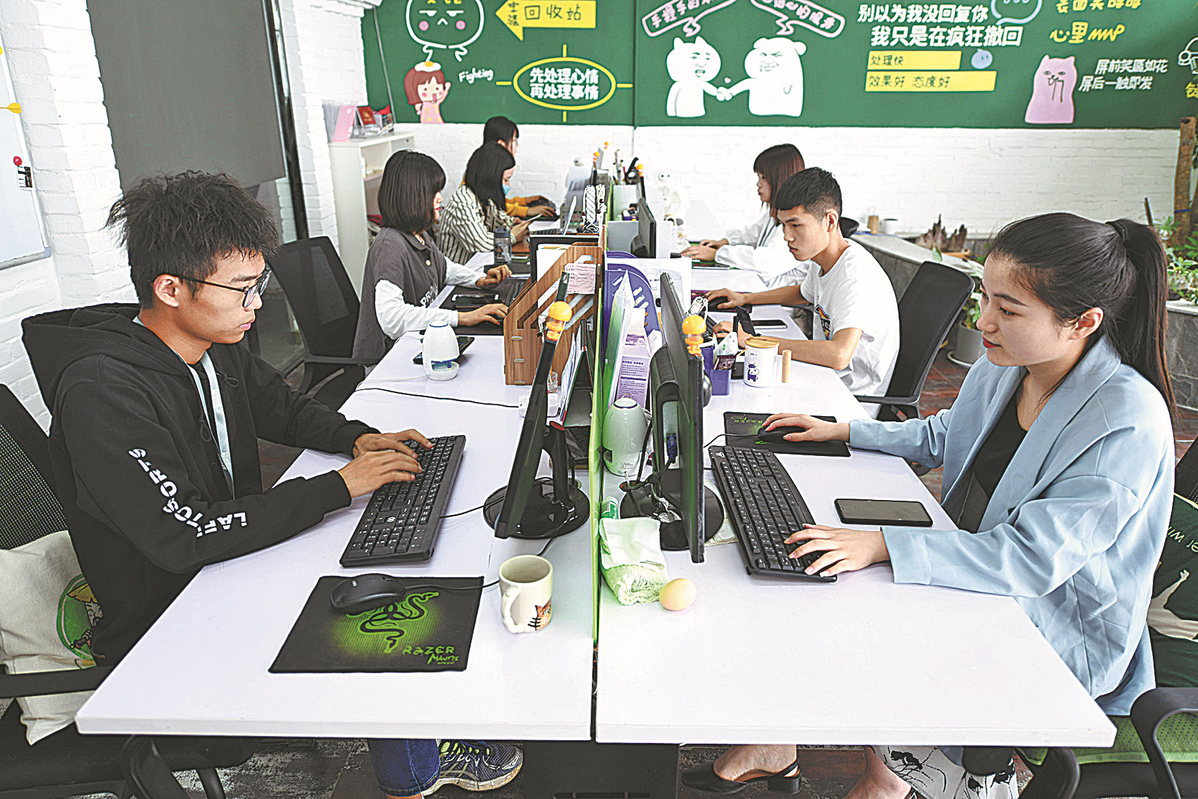Overtime triggers heated discussion after workers' deaths


Hard work rewarded
Lin, who was born in a small village in Heilongjiang province, said her family's finances were below the local average, but in Shenzhen she has bought an apartment and a car thanks to the high salary she earns at Huawei.
"It has been hard work, but this work has paid off," she said.
Lin added that she is grateful to the company for not only improving her finances, but also for broadening her horizons and sharpening her professional skills.
With the prospects of high salaries and quick promotion opportunities, jobs at technology companies are in high demand among college graduates.
According to a survey of more than 5,000 college students this month by China Youth Daily, the IT industry ranked top for the best development prospects, according to 67 percent of the respondents, followed by the culture, sports and entertainment industries (44 percent), education (40 percent) and health and medicine (18 percent).
The National Bureau of Statistics said that in 2020, the IT industry continued to rank top for average annual salaries for employees in urban areas.
The average annual salary at publicly owned IT companies reached 177,544 yuan, while at privately operated enterprises it was 101,281 yuan, with the figures at the top of a list of 18 major industries in urban areas, the bureau said. Agriculture, forestry, husbandry and fishing had the lowest salaries-less than 50,000 yuan in the public sector and below 40,000 yuan in the private sector.
As Chinese technology enterprises rose to global prominence, employees with company shares paying annual dividends achieved their first particularly large sums, or "pots of gold"-sometimes as much as hundreds of thousands or even a million or more yuan for individual staff members. In many cases these payouts eclipsed annual salaries.
Guan Xiaoyu, lecturer at the School of Government at Beijing Normal University, said the success and rapid expansion of Chinese tech companies in the past 20 or so years is based on hardworking employees willing to put in extra hours in exchange for a decent salary and career development.
Companies whose employees sacrificed their personal life by working as hard as they could to deliver projects regardless of obstacles, outperformed competitors, Guan said.
Default setting
However, Guan added that the enthusiasm for and popularity of tech companies among job applicants has prompted some entrepreneurs to treat the 996 work schedule as a default setting or tacit requirement for their businesses.
In 2019, Alibaba Group founder Jack Ma endorsed the 996 work culture, describing it as a blessing for people employed at leading technology companies.
The same year, Zhu Ning, founder and CEO of e-commerce business Youzan, which is based in Hangzhou, capital of Zhejiang province, called on all employees to embrace this work culture after it was announced that it would be made company policy.
Zhu said in a WeChat post that the human resources department at Youzan would tell job applicants that working for the company means huge pressure, and that many employees have become fully accustomed to working extra hours.
Tang Daisheng, professor at the School of Economics and Management at Beijing Jiaotong University, said that while most companies consider the 996 work schedule as a "hidden rule", some have made it a policy, which clearly violates the Labor Law and puts employees at fault for non-compliance.
He said that entrepreneurs can work as much as they want and consider 996 a blessing, but they should not hold their employees to the same standard.
Tang added that while well-known IT companies offer high-paid jobs to employees, their well-educated and highly-skilled workers are also a blessing to such enterprises, whose development relies on innovative and efficient staff members.
"It is a mutually beneficial relationship. The companies should not make employees feel indebted to them or use ways to brainwash them into believing that working additional hours is a blessing," he said.
Moreover, working overtime for a long period increases the risk of developing psychological and physical problems such as depression, sleeping disorders and strokes, Tang said, adding that social and economic development is also affected in the long term.
In Japan, for example, after the country experienced rapid development, it faced obstacles to economic growth, such as psychological problems and an unwillingness among people to marry and have children, due to social issues resulting from a long-term culture of overworking.


















